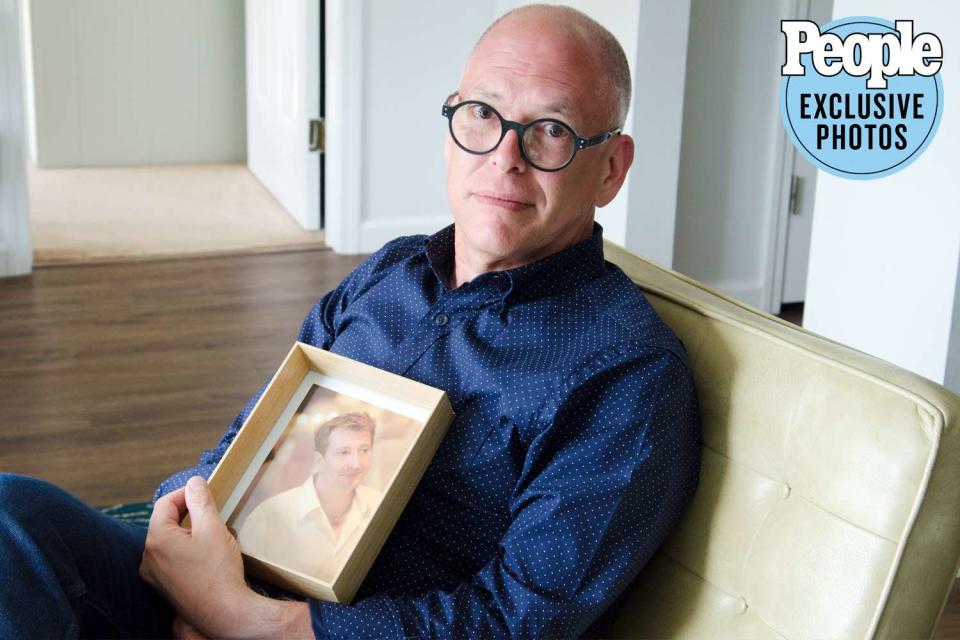Jim Obergefell, Whose Landmark Case Legalized Gay Marriage, Says 'I Have to Keep Fighting' as Roe Is Overturned

It's a difficult position to be in, running for state legislature while the nation at large demands your attention, but Jim Obergefell handles it with grace.
"I never in my wildest dreams thought I would be in the place that I am, having gone to the Supreme Court, having my name on a landmark civil rights case," he tells PEOPLE. "But it is. And with that comes visibility; with that comes a voice."
Obergefell, 55, whose resume includes German teacher, real estate agent, business owner and champion for equality, is currently running for a seat in the Ohio House. It's something he'd considered for years, after pursuing a lawsuit that ultimately reached the Supreme Court, Obergefell v. Hodges, the landmark 2015 case which earned same-sex couples the right to marry nationwide.
RELATED: Lead Plaintiff in Historic Gay Marriage Case Announces Ohio State House Campaign
Beyond the confines of Erie, Ottawa and Huron counties, though, society has already tasked him with the unofficial responsibility of standing up for marginalized groups. "I do feel an obligation, but it's an obligation of the best sorts," he says — one "to do the right thing, to make the world better," for not only the queer community but all humans.

Bridget Barrett Jim Obergefell
That obligation got more dire on Friday when the conservative-leaning Supreme Court overturned Roe v. Wade, eliminating the constitutional right to abortion, which had been in place for nearly 50 years, and hinted that next steps may include reconsidering three rulings surrounding birth control and gay relationships. (Obergefell's own landmark SCOTUS victory was mentioned by Justice Clarence Thomas as a "demonstrably erroneous" precedent.)
Listen below to an interview with Jim Obergefell on our daily podcast PEOPLE Every Day.
"It just angers me and terrifies me that we have the highest court in the land who wants to harm hundreds of thousands — millions — of people across the country and put marriages in limbo and prevent people from committing legally to the person they love," Obergefell adds. "Especially when [Thomas'] own marriage is the result of a Supreme Court decision."
(Many critics, including Samuel L. Jackson, have pointed towards the fact that Thomas, who is Black and is married to a white woman, has personally benefitted from the long-established precedent of Loving v. Virginia, the landmark 1967 Supreme Court precedent that legalized interracial marriages.)
Adds Obergefell: "I would like to say to Justice Thomas: 'If you want to see an error in judgement, look in the mirror.' Hundreds of thousands of couples across this nation do not need him imposing his twisted morality on them."

Bridget Barrett Jim Obergefell at his hometown Pride celebration in Sandusky, Ohio
With a focus on re-examining cases that were decided under the umbrella of the constitutional right to privacy, Obergefell says understanding those sacred rights is more important than ever.
"The right to privacy, that's something we all deserve as human beings. And it's something that our constitution should keep sacrosanct, but [overturning Roe] takes that away," Obergefell says, calling bodily autonomy a "fundamental right" that opens Pandora's box once lost. For same-sex couples, "That is their private marriage. It doesn't impact anyone else."
Thomas has also taken aim at 2003's Lawrence v. Texas — which invalidated archaic sodomy laws that banned private sexual activity between two people of the same sex, something Obergefell calls "dangerous."
"We are at risk of having our intimate relations once again be criminalized," he warns. "It's fundamental to who we are as a people, having that person that you love, you care for and you make these promises to. To have that taken away … that does irreparable harm to our nation."
It was Obergefell's promise to love, honor and protect his own special someone — a man named John Arthur, who died of ALS three months after their 2013 wedding — that set his now-famous legal battle into motion.
"I was fighting for the love of my life and for us to exist, for us to matter," he says, explaining that they couldn't stand the thought of Arthur's death certificate showing he died unmarried. "When we lost at the Sixth Circuit Court of Appeals, I could've at that point thrown in the towel and said, 'I want to go back to just being quiet Jim,' but I couldn't because I had to live up to my promises to John."

Bridget Barrett Jim Obergefell
Obergefell became the face of the marriage equality movement when his case reached the Supreme Court, backed by other plaintiffs whose names never became shorthand for gay rights but whose cases were equally important in getting D.C.'s attention.
When the Supreme Court sided with Obergefell and Arthur on June 26, 2015 — seven years ago this week — Obergefell told PEOPLE that he "felt more like an equal American than I had in a very long time."
Never miss a story — sign up for PEOPLE's free daily newsletter to stay up-to-date on the best of what PEOPLE has to offer.
Once the excitement faded, though, he realized that was an overstatement.
In the years since Obergefell v. Hodges became precedent, queer people have not escaped discrimination in the United States. This year alone, lawmakers around the nation have drafted legislation targeting drag queens, inclusive education, gender-affirming care, trans athletes, and even parents of LGBTQ+ youth. In Obergefell's home state, a House bill was passed that permitted internal and external genital inspections on any girl who was suspected of being transgender; after facing nationwide backlash, that part of the bill was finally removed.
"These decisions, this movement towards government intrusion into our bedrooms, into our doctor's offices, into our schools, everyone should be worried about that," Obergefell says. "Can we all just treat each other as human beings deserving of the same dignity, the same respect, the same rights?"

Bridget Barrett Jim Obergefell at his hometown Pride celebration in Sandusky, Ohio
When Obergefell feels fatigued watching Americans run around in circles, he thinks of the young people — the University of Tennessee student who told him that if it weren't for the hope that came with Obergefell v. Hodges, she fears she would have killed herself; the teenage boy who burst into tears in his car when Amy Coney Barrett was confirmed to the Supreme Court, worried he would lose his right to marry before falling in love — and he picks himself back up.
"That's what keeps me going, knowing that I'm part of this movement, part of a history," he says, acknowledging that he stands on the shoulders of people who were more marginalized and who risked "a heck of a lot more" than he has. "I want kids to grow up in a better world than the one I grew up in."
"So, I get tired. I'm a human being, of course I get tired. But I'll keep fighting because it's the right thing to do."
Virginia Chamlee contributed to this report.


